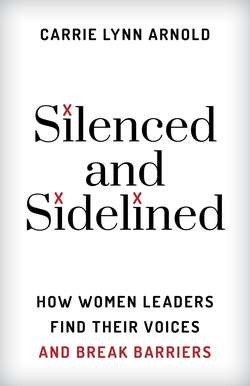Читать книгу Silenced and Sidelined - D Lynn D Arnold - Страница 14
На сайте Литреса книга снята с продажи.
Confidence
ОглавлениеWomen in leadership will undoubtedly experience a dip—but this is not just about a loss of confidence. Yes, that happens when someone feels silenced, and I would argue that the women in my research described the loss as a symptom but not the whole of the experience. Kay and Shipman describe confidence as a matter of choice—it is volition. In their book, The Confidence Code: The Science and Art of Self-Assurance—What Women Should Know, they describe confidence-building habits and how genetics may play a part.[1] Just as everything is not always about silencing, it is equally valid that everything is not always about confidence. When we are confident, we believe in our capability. There is a sense of trust or certainty in the truth of something.
I can be extremely confident in one area of my life and be lacking in another. In theory, confidence builds through repetition and encouragement. The more I write or speak on a topic; my confidence grows. The more I train for a marathon (so not me), my confidence in my stamina increases.
Sometimes we need an entire confidence makeover, and sometimes it is fine-tuning. I see a lot of young people entering the workforce and leadership with ingrained confidence. They have not had too many setbacks yet to question their ability. They charge forward with eagerness and confidence that is primarily based on the encouragement of others and their self-talk. When they hit that first setback, often they just need to rebuild in the area they experienced failure. Practice, training, or development is required.
When it comes to being an executive leader—who gets to practice? Unfortunately, rehearsal time is over! I do not know many executives who get a lot of do-overs if they say the wrong thing in a meeting or make the wrong high-stakes decision. Every choice is scrutinized, and every behavior matters. There is no test environment before you go live, and lower levels of leadership are not always preparing women for what they encounter in executive roles.[2]
The women in my research had varying degrees of confidence, and it did not always shift their experience when silenced. In fact, women with a strong sense of self-confidence were sometimes the hardest hit. They were stunned by silencing when it occurred and often did not know how to respond. Had someone just given them advice on increasing their confidence—it would have missed the mark. Sometimes all the confidence in the world will not save you from the curveballs of silencing.
Silencing is complex. When someone experiences viral silencing, they may feel victimized, bullied, and feel a dip in confidence. It is rarely just one of these things. It can be all three or more. What follows is a summary of what it is like to feel pervasively silenced. This describes the history of dozens of women I interviewed. I listened to over 100 hours of women describing their experience. From those interviews, I have captured a general summary. This description is intended to give insight into what it is like so that when you put down this book, you will have a better understanding.
This summary is not intended to represent every woman’s path, and some things are real for most but not all.
